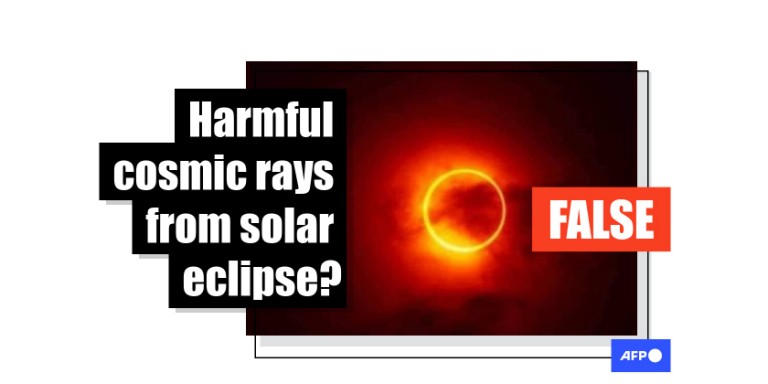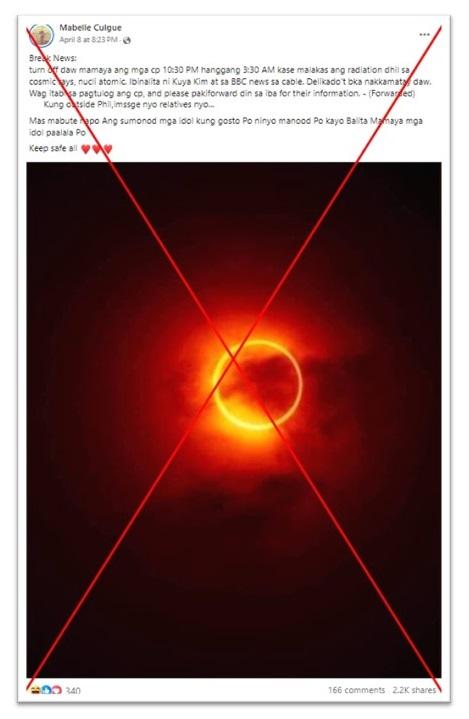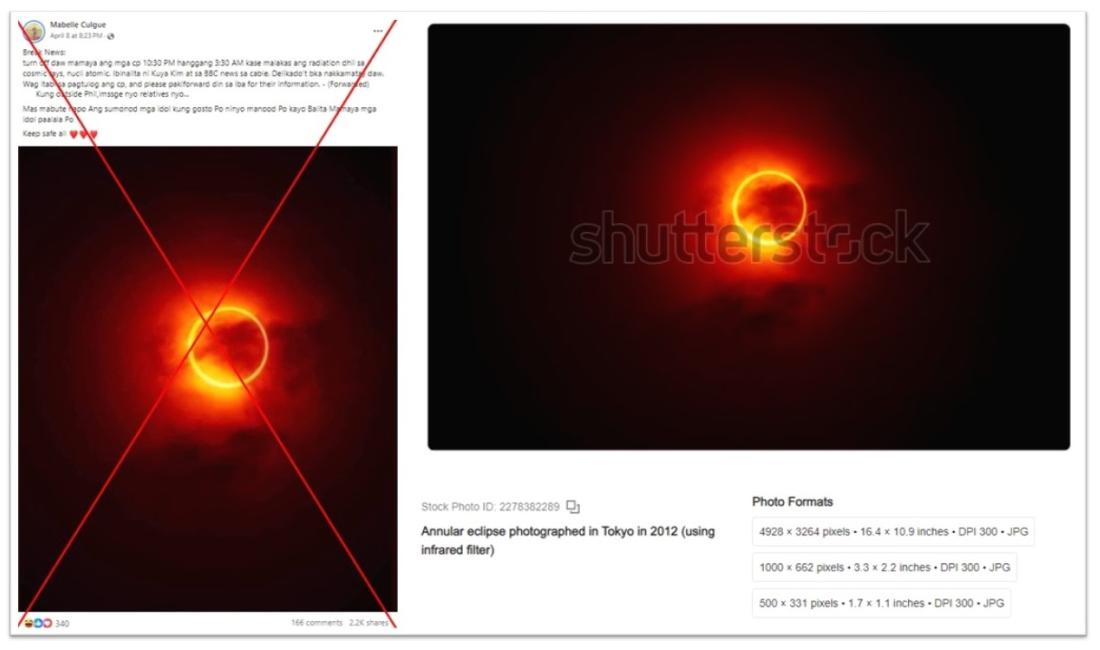
'Harmful cosmic rays' hoax recirculates as eclipse mania sweeps North America
- This article is more than one year old.
- Published on April 16, 2024 at 04:43
- 3 min read
- By Ara Eugenio, AFP Philippines
"Break (sic) News: We must turn off our cell phones later from 10:30 pm to 3:30 am due to strong radiation because of cosmic rays, nucli (sic) atomic," reads the Tagalog-language caption to a photo posted here on Facebook on April 8, 2024.
The image -- shared more than 2,000 times -- shows the Sun partly obscured by the Moon during an eclipse.
"This was reported by Kuya Kim and BBC News on Cable," it goes on to claim, warning that cosmic radiation was "dangerous and potentially deadly" so people should therefore avoid sleeping near a mobile phone.
Filipino television personality Kim Atienza, popularly known as Kuya Kim, was falsely cited in the post. He wrote on Instagram on April 9 that he had "never delivered such a report" (archived link).
AFP also found no such report published by the BBC.

The false post circulated on the same day a highly anticipated solar eclipse was visible across North America.
The celestial spectacle gripped millions on its path as the Moon fully eclipsed the Sun, briefly plunging parts of the continent into darkness.
The same false claim was shared on Facebook here, here and here.
AFP previously debunked a similar hoax in 2021.
Not harmful to humans
Arcy Layne Sace, an astrophysicist at the Philippine Space Agency, told AFP on April 15, 2024 that the post lacked scientific basis.
"Simply put, the effects of cosmic rays on humans on Earth are greatly exaggerated in the post -- not to mention its implication that the solar eclipse is the source of those deadly cosmic rays, which is false," he said, noting solar eclipses were "naturally reoccurring phenomena".
"They will not cause any concerns with regards to anyone's phone, and certainly will not directly cause death," he said.
Sace explained that whilst cosmic rays can technically be harmful, they are not a risk to human health.
"Despite the sheer number of cosmic rays from both the Sun and sources outside the Solar System, we are safe from them because the Earth has a magnetic field and atmosphere, especially the ozone layer, that serve as protection against cosmic rays."
Supalerk Karuehanon, who heads the Astronomical Academic Services Division of the National Astronomical Research Institute of Thailand, gave AFP a similar explanation in 2021.
"Cosmic rays, which are emitted from the sun or from cosmic events outside our solar system such as black holes or a supernova, can affect electronic devices such as computer chips on satellites. However this doesn't mean the rays will affect our bodies in the same way," he said.
Other space agencies, including the US' National Aeronautics and Space Administration and National Oceanic and Atmospheric Administration, as well as the European Space Agency, have also given scientific explanations of cosmic rays (archived links here, here and here).
Unrelated photo
A reverse search on Google found the eclipse photo used in the post was previously published on the US-based stock photo site Shutterstock (archived link).
"Annular eclipse photographed in Tokyo in 2012 (using infrared filter)," reads the caption, referring to another type of eclipse in which the Moon obscures all but the Sun's outer ring (archived link).
Below is a screenshot comparison between the photo in the false post (left) and the photo on Shutterstock (right):

AFP has debunked other claims about the eclipse here, here and here.
Copyright © AFP 2017-2026. Any commercial use of this content requires a subscription. Click here to find out more.
Is there content that you would like AFP to fact-check? Get in touch.
Contact us
